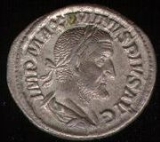
Coin flipping
Overview
Coin
A coin is a piece of hard material that is standardized in weight, is produced in large quantities in order to facilitate trade, and primarily can be used as a legal tender token for commerce in the designated country, region, or territory....
in the air to choose between two alternatives, sometimes to resolve a dispute between two parties. It is a form of sortition
Sortition
In politics, sortition is the selection of decision makers by lottery. The decision-makers are chosen as a random sample from a larger pool of candidates....
which inherently has only two possible and equally likely outcomes.
The historical origin of coin flipping is the interpretation of a chance outcome as the expression of divine will.
A well-known example of such divination
Divination
Divination is the attempt to gain insight into a question or situation by way of an occultic standardized process or ritual...
(although not involving a coin) is the episode in which the prophet Jonah
Jonah
Jonah is the name given in the Hebrew Bible to a prophet of the northern kingdom of Israel in about the 8th century BC, the eponymous central character in the Book of Jonah, famous for being swallowed by a fish or a whale, depending on translation...
was chosen by lot to be cast out of the boat, only to be swallowed by a giant fish (Book of Jonah
Book of Jonah
The Book of Jonah is a book in the Hebrew Bible. It tells the story of a Hebrew prophet named Jonah ben Amittai who is sent by God to prophesy the destruction of Nineveh but tries to escape the divine mission...
, Chapter 1).
Coin flipping as a game was known to the Romans as "navia aut caput" (ship or head), as some coins had a ship
Ship
Since the end of the age of sail a ship has been any large buoyant marine vessel. Ships are generally distinguished from boats based on size and cargo or passenger capacity. Ships are used on lakes, seas, and rivers for a variety of activities, such as the transport of people or goods, fishing,...
on one side and the head of the emperor
Roman Emperor
The Roman emperor was the ruler of the Roman State during the imperial period . The Romans had no single term for the office although at any given time, a given title was associated with the emperor...
on the other .

